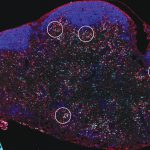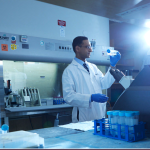Yael Leder, a 34-year-old from a town near Tel Aviv, Israel, learned last year that her cancer had returned—despite removal of her thyroid and some lymph nodes and treatment with radioactive iodine. Worse yet, the cancer was revealed in a place that might prove extremely difficult to treat: a lymph node next to the base of her skull and touching the main artery to her brain. An avid runner with two young sons, Yael remembers her shock. “I was feeling the best I’ve ever felt,” she recalls.
With that horrible news, she and her mother, Hannie, a former operating room nurse, began the desperate search for a treatment. Yael says her doctors in Israel could not agree on a course of action because of the cancer’s challenging and unusual location. After months of indecision, some physicians finally suggested that she simply watch and wait, a course that struck Yael as foolhardy.
Meantime, Hannie had searched online and conferred by phone and email with oncologists at some of the world’s leading cancer centers. She ultimately was steered to UPMC and Dr. Carl Snyderman, an international leader in the delicate art of skull base surgery. He and his team proposed a minimally invasive approach that would reach the tumor through the neck using an endoscope to allow careful dissection of the cancer off of the artery. On Feb. 21, they successfully performed the operation, and two days later, Yael was recovering in her Pittsburgh hotel with a tiny, 2-inch scar on her throat.
Yael was guided through her treatment process and her stay in Pittsburgh through the UPMC Global Care program, which helps with housing arrangements, language translation and coordination of appointments. The effort, which has helped hundreds of patients worldwide over the past few years, is meant to improve access to UPMC’s world-renowned physicians and facilities in Pittsburgh, Ireland and Italy for people who otherwise might not easily navigate the system. “I had to look it up, where was Pennsylvania?” Yael recalls with her infectious laugh.
Her surgeons, Dr. Snyderman and Dr. Paul Gardner, say Yael’s prognosis is good, although she will require regular monitoring. Because of the relationship of the tumor to the small nerves that go to the muscles in Yael’s palate, she required some speech therapy, but her doctors expect that problem to be temporary. Left alone, says Dr. Snyderman, Yael’s tumor would have grown into the surrounding tissues and eventually stuck to the carotid artery, making complete removal difficult if not impossible.
On March 4, Yael and her mother returned home to Kfar Yona after saying goodbye to their doctors and nurses in Pittsburgh. “Everyone was so lovely and caring,” says Yael, eagerly looking forward to her reunion with her sons, 6-year-old Amit and 3-year-old Omri. “I don’t think I could have gotten such treatment any other place.”








